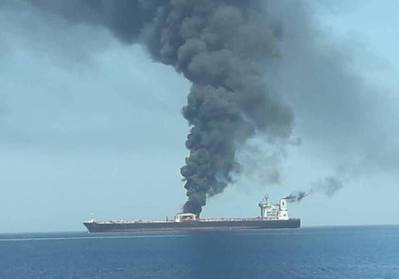Two Tankers Attacked in Gulf of Oman
Two oil tankers were attacked in the Gulf of Oman on Thursday, leaving one ablaze and both adrift, shipping firms said, driving oil prices as much as 4% higher over worries about Middle East supplies.
The Front Altair, carrying petrochemical feedstock, was on fire in waters between Gulf Arab states and Iran after an explosion that a source blamed on a magnetic mine. The Norwegian owner said its crew were safe.
A second Japanese-owned tanker was abandoned after being hit by a suspected torpedo, the firm that chartered the ship said. The crew were also picked up.
Thursday's attacks were the second in a month near the Strait of Hormuz, a major strategic waterway for world oil supplies.
"We need to remember that some 30% of the world’s (seaborne) crude oil passes through the Straits. If the waters are becoming unsafe, the supply to the entire Western world could be at risk," said Paolo d’Amico, chairman of INTERTANKO tanker association.
The United States and Saudi Arabia blamed Iran for limpet mine attacks in May on four tankers off the coast of the United Arab Emirates, a charge Tehran denies.
Tensions have risen since President Donald Trump, who has demanded Tehran curb its military programs and influence in the Middle East, pulled the United States out of a deal between Iran and global powers to curb Tehran's nuclear ambitions.
Thursday's attacks came as Shinzo Abe - prime minister of U.S. ally Japan, a big importer of Iranian oil until Washington ratcheted up sanctions - visited Tehran with a message from Trump and urged all sides not to let tensions escalate.
The Bahrain-based U.S. Navy Fifth Fleet said it was assisting the two tankers on Thursday after receiving distress calls. Britain said it was "deeply concerned" about Thursday's reported explosions and was working with partners on the issue.
Iranian Foreign Minister Mohammad Javad Zarif described the incidents as "suspicious" on Twitter (TWTR), noting that they occurred during Abe's visit to Tehran. He called for regional dialogue.
Oman and the United Arab Emirates, in whose territorial waters the four tankers were hit in May, did not immediately issue any statements after Thursday's attacks.
Saudi Arabia and the UAE, both majority Sunni Muslim nations that have a long-running rivalry with predominantly Shi'ite Iran, have previously said attacks on oil assets in the Gulf pose a risk to global oil supplies and regional security.
Explosion
Bernhard Schulte Shipmanagement said the Kokuka Courageous was damaged in a "suspected attack" that breached the hull above the water line while transporting methanol from Saudi Arabia to Singapore.
It said the ship was afloat and the crew safe with one minor injury reported.
A shipping broker said the blast that struck the Kokuka Courageous might have been caused by a magnetic mine. "Kokuka Courageous is adrift without any crew on board,” the source said.
Japan's Kokuka Sangyo, owner of the Kokuka Courageous, said its ship was hit twice over a three-hour period.
Taiwan's state oil refiner CPC said the Front Altair, owned by Norway's Frontline (FRO), was "suspected of being hit by a torpedo" around 0400 GMT, as it carried 75,000 tonnes of the petrochemical feedstock naphtha to Taiwan.
Frontline said its vessel was on fire but afloat, denying a report by the Iranian news agency IRNA that the vessel had sunk.
The master of the Front Altair ordered the 23-member crew to abandon ship after a blast, International Tanker Management, the technical manager of the vessel, said in a statement. It said the crew were picked up by the nearby Hyundai Dubai.
The Front Altair loaded its cargo from Ruwais in the UAE, according to trade sources and shipping data on Refinitiv Eikon.
Iran's IRNA reported that Iranian search and rescue teams had picked up 44 sailors from two damaged tankers and had taken them to the Iranian port of Jask. That report could not immediately be confirmed.
Thursday's suspected attacks came a day after Yemen's Iran-aligned Houthis fired a missile on an airport in Saudi Arabia, injuring 26 people. The Houthis also claimed an armed drone strike last month on Saudi oil pumping stations.
Iranian Supreme Leader Khamenei told Abe during his visit to Iran that Tehran would not repeat its "bitter experience" of negotiating with the United States, state media reported.
"I do not see Trump as worthy of any message exchange, and I do not have any reply for him, now or in future," the Iranian leader said.
(Reporting by Koustav Samanta, Jessica Jaganathan, Liang-Sa Loh, Yimou Lee, Terje Solsvik, Ghaida Ghantous and Jonathan Saul; Writing by Edmund Blair; Editing by Jon Boyle)

